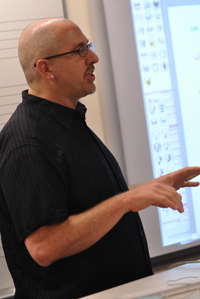Michael Johnson
For media inquiries, please contact Media Relations
Michael Johnson is an associate professor in the Contemporary Writing and Production Department at Berklee College of Music. He is a vocalist, multi-instrumentalist, composer/arranger, and producer/engineer. His vocal and instrumental arrangements and compositions have been performed by groups all over the United States since the late 1980s. As a vocalist and guitarist, he has shared the stage with artists such as Take Six, Jon Secada, Lari White, Dawnn Lewis, and Bob Dorough. His recorded vocals, guitar, and bass have been heard on national television, single and album releases, and commercial jingles.
As a recording engineer, he has worked at studios such as South Beach Studio in Miami, Florida, and New River Studio in Fort Lauderdale, Florida. He has produced, engineered, mixed, and mastered numerous recordings over the years, from singles and demos to full album projects. He holds a Bachelor of Science in Music from the University of Colorado, as well as a Master of Music and Doctor of Musical Arts in Studio Music and Jazz Performance from the University of Miami. His original solo work, as "Michael J. Johnson," can be found on iTunes, Spotify, and other online music services.
- Guitarist, vocalist, composer, arranger, producer, and engineer
- Performances with Jon Secada, Bob Dorough, Lari White, Dawnn Lewis, and Glenn Kaiser
- Opened for Take Six and Kevin Nealon
- Arrangements and compositions performed by University of Miami Jazz Vocal 1, Texas All-State Jazz Choir, and many others
- Session vocalist on tracks for Royal Carribbean Cruise Lines, CPP Belwin, Orange Bowl halftime shows, and various commercial jingles and album projects
- Producer/engineer on various recording projects, including Kulture Shock by Urban Derivatives, Moment's Notice by University of Miami Jazz Vocal 1, and many others
- Publications include Pop Music Theory and Songwriting
- Recordings as a leader include Sonic Cinema, Odyssey, Bay of Pigs, and Manifesto, Vol. 1
-
School NameUniversity of MiamiState or ProvinceFloridaDegreeDoctor of Musical Arts (D.M.A.)Field of StudyJazz StudiesDate Degree Received
-
School NameUniversity of MiamiState or ProvinceFloridaDegreeMaster of Music (M.M.)Field of StudyJazz StudiesDate Degree Received
-
School NameUniversity of Colorado DenverState or ProvinceColoradoDegreeBachelor of Science (B.S.)Field of StudyMusicDate Degree Received

